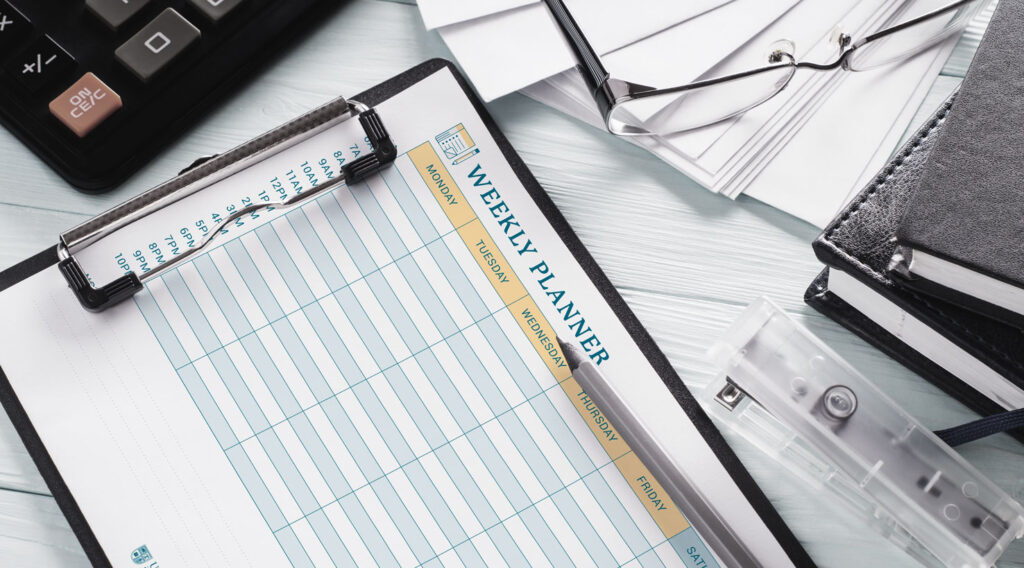Deadlines, crunch time, nap time; time defines everything. And whether it be professional or social obligations, chances are you have a lot to manage in the time you do have. By treating time management as a necessary and helpful tool, you can improve efficiency in every aspect of your day-to-day. Read on for ten tips to help you to make the most of every minute.
1. Create a Personalized Weekly Schedule

The most daunting part of figuring out how to more efficiently manage your time is getting started. Instead of stressing, sit down and create a personalized schedule. Make a list of all the activities you need to accomplish in a week. Lay out your week ahead of time by budgeting out your day into one-hour chunks.
For example; 6:30 am wake up, 6:30-7:30 am shower, eat breakfast and get dressed. It’s not overkill to go into extreme detail. According to HealthMarkets, knowing exactly what you need to accomplish and when – and when you have wiggle room – will help reduce your overall stress level. Being aware of what you need to focus on also helps increase productivity.
2. Structure Your Spare Time
Not only your productive hours, but your “off” hours deserve the scheduling treatment. By designating certain portions of the day into creative, exercise or downtime allows your brain to know when it can relax. Map everything out on a schedule (digital or a physical planner), including free time. Looking at a physical representation of your week lets you see what your actual work-life balance consists of. Make sure you’re scheduling periods of time to relax, proportionate to the amount of time designated for work.
3. Stick to a Consistent Sleep Schedule

Everyone’s specific sleep requirements differ but identifying yours, and tailoring your sleep schedule to accommodate those hours, can immediately boost productivity. Experts recommend anywhere from 6-8 hours of sleep as an adult. Dial in on your body’s needs and make sure that your schedule allows for this. Obviously, it is not always possible to achieve your sleep goals, but by adhering to them as often as you can, you set yourself up for optimum success during your waking hours.
4. Keep Track of Your Scrolling
We’re all guilty of falling into the rabbit hole of endless scrolling on our smartphones or tablets. A little voyeurism can be a healthy distraction, but when it detracts from the time you need to spend on real-world responsibilities, it’s a problem. Scrolling at night can also affect your body’s circadian rhythms, hindering your cognitive abilities for the next day.
Decide on the amount of time you’ll want to allow yourself to do this daily, and stick with it. Regularly look at the tracking software on your device to check the amount of time you’ve spent browsing the internet or social media platforms. If screen time reaches problematic levels outside of your budgeted allotment, install a timer app that closes your apps or shuts off your phone when needed.
5. Prioritize

When consulting your list of daily tasks, there are higher priority items or things that take longer to complete. Time-consuming tasks should be completed first. Apply that same tact to the tasks you always procrastinate on. Anything that causes you to waste time should be mitigated. By ranking the items you need to accomplish in a day, and completing the more important ones first, you’re much more likely to achieve everything you set out to do. (Plus, get those annoying tasks out of the way).
6. Identify Your Productivity Zone
Just like individualized sleep schedules, you have certain points in the day when you’re operating at peak brainpower. For a majority of individuals, this window occurs in the morning, although for a select few, they perform the best in the evening. Do some self-observation to discover which time is ideal for you, and use this data to construct your schedule for peak productivity.
Most people experience a slump in the afternoon, just after lunch. Plan accordingly by scheduling activities you can complete without a high level of cognitive function. Likewise, schedule the highest priority items of your day during your peak productivity zone.
7. Minimize Distractions

The ultimate enemy of efficiency is distraction. This applies to smart devices, but also any unexpected event that pulls your attention from your pre-scheduled activities. To avoid the most common issues, turn your phone on silent and establish boundaries with family/friends surrounding when you can and cannot socialize. A UK study found that over 759 hours per year are wasted on workplace distractions alone. By doing everything in your power to avoid distractions, you’ll notice your time is more effectively spent.
8. Stop Trying to Multitask
Being able to multitask is a commonly touted falsehood. The human brain is not made to split focus between tasks. Devote all of your brainpower to your current task at hand and the work you produce will be of much higher quality. By working through your to-do list one item at a time (instead of multitasking), and you’ll be much more efficient, as well as accomplish more by the end of the day.
9. Learn to Delegate

Similar to multitasking, there’s no shame in admitting that maybe you can’t do it all. Whether you’re a working professional, a business owner with a side hustle or an overwhelmed parent, you can use an extra hand. Take a hard look at your responsibilities and decide which tasks to delegate to others. Enlist the help of an app to help you transcribe meeting notes at work, get groceries delivered or even have your children help with household chores. Your time is precious and if there are tasks you can offload, do so in order to make the most out of every day.
10. Organize, Organize, Organize
Think about how much time you spend in a day searching for misplaced items, probably more than you would like to admit. Organize your space and you’ll organize your life. By laying out items where they’re easy to find, and having the more important items located in easy-to-access spots, you’ll save yourself precious minutes. This compounds over weeks and months to provide you with plenty of extra hours to devote to the things you truly love.
Practice these time management suggestions and watch as the rewards of your diligence start to roll in. Stressing about not having enough hours in the day will be a thing of the past, and the hours you do have will be more enjoyable and productive.
Related Posts:
- The Last of Us 2: February Release Date, Pre-orders…
- 5 Time-Saving Spend Management Tips for Growing Businesses
- Top 6 Action Mangas You Need to Read This Month
- Netflix Complete Schedule for November Month
- Why Florida's Sports Betting Launch Faces A One-Month Delay
- Golem for PlayStation VR Releases Next Month? Find Out Now








